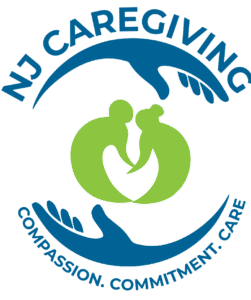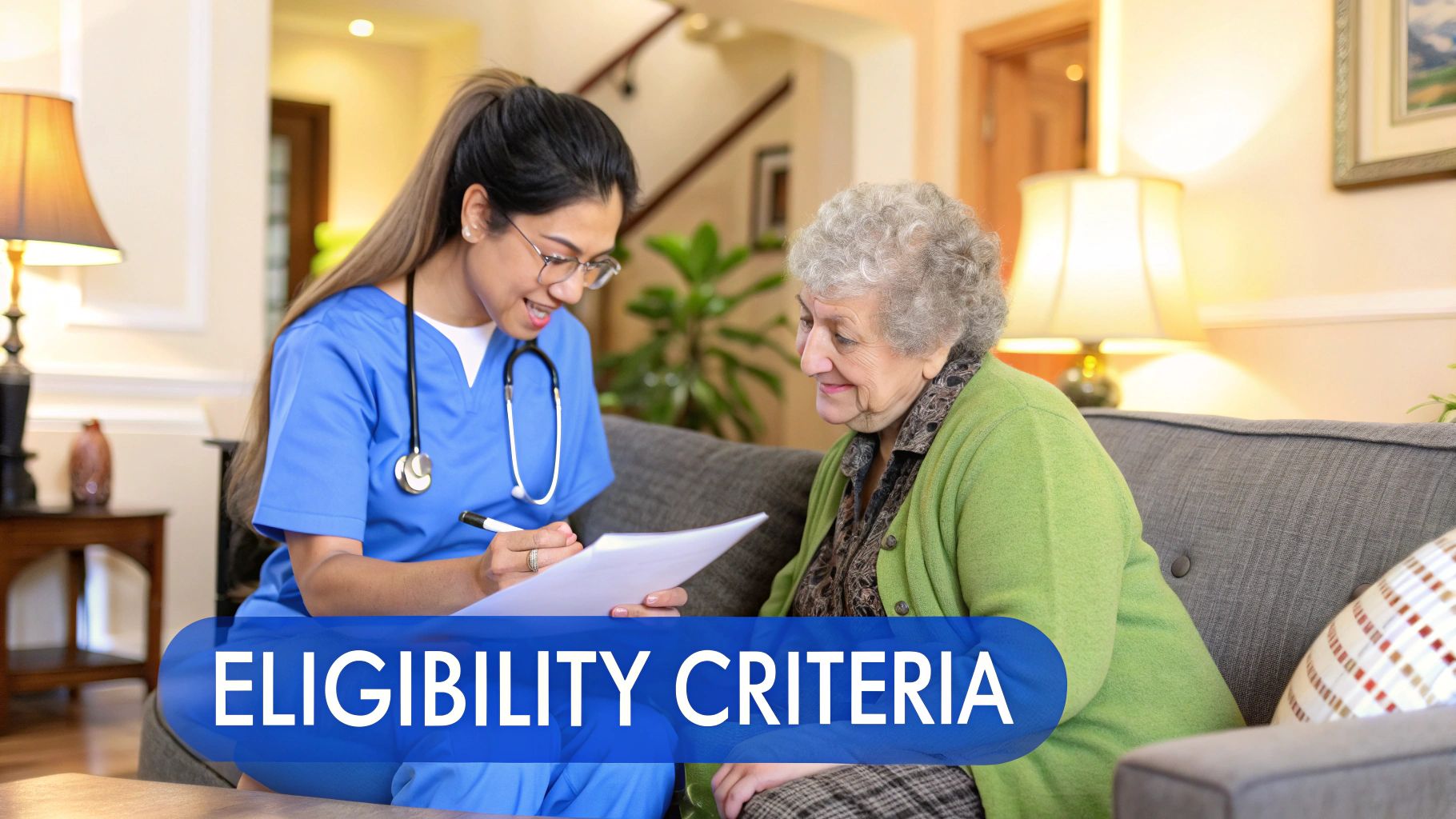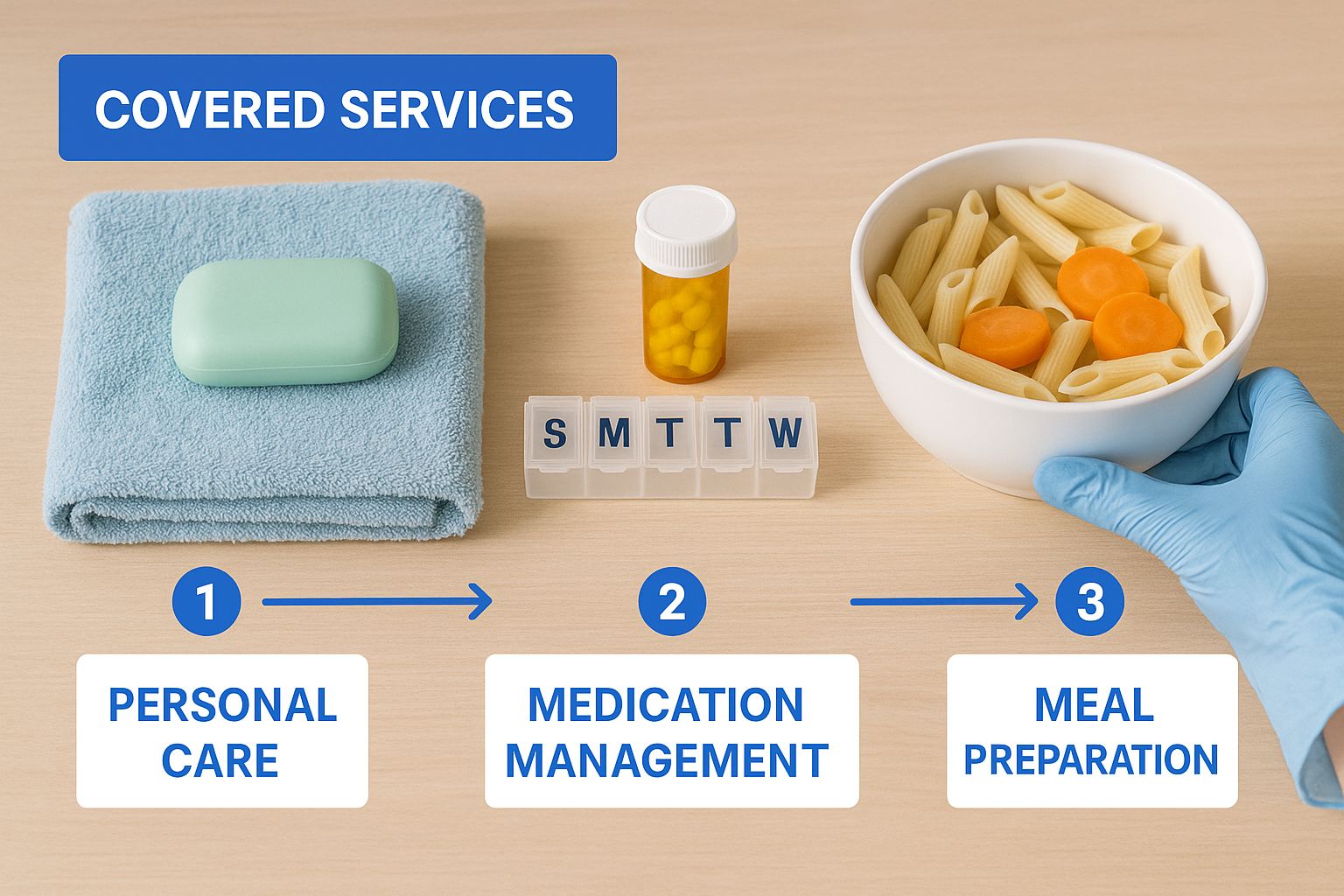A Medicaid waiver program in NJ is a lifeline for families looking for an alternative to nursing homes or other institutions. It’s designed to provide long-term care support right in the comfort of a person's own home and community.
Think of it as a specialized path that navigates around the standard Medicaid rules. Instead of funding institutional care, it directs those funds toward services that help people live more independently and enjoy a better quality of life.
How Waivers Help People Stay at Home
Imagine standard Medicaid as a general healthcare plan. For most routine needs, it works just fine. But for those who need long-term support—like older adults or individuals with disabilities—the standard path often leads directly to a nursing facility. This is exactly where the NJ Medicaid waiver program steps in and rewrites the script.
The term "waiver" simply means the federal government agrees to "waive" some of its usual rules. This gives New Jersey the green light to use Medicaid money for what are known as Home and Community-Based Services (HCBS). This isn't just about changing the location of care; it's a fundamental shift in the entire approach to care. It moves away from a rigid, one-size-fits-all institutional model to a flexible, person-centered plan tailored to someone's real-life needs.
The core idea is simple but incredibly powerful: people are almost always healthier and happier when they can stay in familiar surroundings, connected to their family, friends, and community. A waiver makes this possible.
The Growing Shift Toward Community-Based Care
New Jersey has been deliberately moving toward more home-based support for years. This commitment is clear in the state's Managed Long-Term Services and Supports (MLTSS) program. The results speak for themselves. Back in August 2017, out of the 52,000+ people enrolled in Medicaid long-term care, an impressive 66 percent were receiving services in their own homes or communities, not in institutions.
This focus on keeping people at home allows waiver programs to offer a wide range of practical support, including things like:
- Personal Care Assistance: Help with daily activities like bathing, getting dressed, and preparing meals.
- Home Modifications: Making a home safer with additions like wheelchair ramps or grab bars in the bathroom.
- Case Management: A dedicated professional who helps you coordinate all the different services and create a solid care plan.
- Respite Care: Giving family caregivers a much-needed break to rest and recharge.
By funding these types of services, the Medicaid waiver program in NJ gives people the power to live with more dignity and control over their own lives.
To help you get a quick overview of what's available, here’s a table summarizing the different types of waiver programs in New Jersey.
New Jersey Medicaid Waiver Programs At a Glance
| Waiver Program Type | Primary Population Served | Core Service Focus |
|---|---|---|
| Managed Long-Term Services & Supports (MLTSS) | Seniors (65+) and adults (21+) with physical disabilities | Personal care, respite care, home modifications, assisted living services |
| Community Care Program (CCP) | Individuals who need nursing home level of care but can stay at home | Wide range of HCBS, including case management and personal emergency response systems |
| Supports Program | Adults (21+) with intellectual or developmental disabilities (I/DD) | Employment support, behavioral management, community-based support |
| Children’s System of Care (CSOC) | Youth (under 21) with I/DD or serious behavioral/emotional needs | Intensive in-home support, behavioral therapies, family support services |
Each of these programs is built to address the specific needs of the people it serves, ensuring the right support gets to the right person.

Who Qualifies for a Medicaid Waiver in NJ?

This is the most important question and the first step on this journey. Getting approved for a Medicaid waiver program in NJ isn’t about checking a single box. It's about meeting two different sets of requirements at the same time: your financial situation and your medical needs.
Think of it like opening a special gate that has two separate locks. You absolutely need the right key for each one to get through. The first key is your finances, and the second is your level of medical or functional need.
Let’s break down exactly what each of those keys looks like.
The Financial Eligibility Lock
First things first, we have to look at your financial standing. Because waivers are an extension of Medicaid, you must first meet the income and asset limits for NJ FamilyCare, which is New Jersey's Medicaid program. These rules are there to make sure services get to the people who need them most.
The state is going to look at two main things:
- Income: This is almost any money you have coming in, like Social Security checks, pension payments, or wages.
- Assets: This covers things you own, like cash in the bank, stocks, bonds, and any real estate that isn't your primary home.
The exact dollar limits can and do change, so it’s always smart to check the latest numbers. For many people, these financial rules are the biggest hurdle. But it's good to know there are sometimes legal tools, like a Qualified Income Trust (QIT), that can help people whose income is just a little too high still find a way to qualify.
Key Takeaway: To even be considered for a waiver, you must be financially eligible for NJ FamilyCare (Medicaid). This means fitting within strict income and asset limits.
The Clinical Eligibility Lock
The second key is what’s called clinical eligibility, or meeting a specific "level of care." This is the entire foundation of every waiver program. Essentially, it means you have to require the same level of support you would typically get in a place like a nursing home.
The whole point of the waiver is to give you an alternative to moving into an institution. So, you first have to be formally assessed and certified as needing that high level of care, even though the goal is to get it at home instead. This isn't just about getting a quick note from your doctor; it's a formal evaluation process.
To figure this out, the state sends a professional—usually a nurse—to conduct a standardized clinical assessment. They’ll look at how well you can manage Activities of Daily Living (ADLs), such as:
- Bathing and getting dressed
- Eating and preparing your own meals
- Getting around and transferring (like from a bed to a chair)
- Using the restroom and personal hygiene
On top of the state’s assessment, medical records and documents from your doctors are crucial. They help paint a full picture of your health needs. The goal is to officially show that without the support from a waiver, you would probably need to live in a nursing facility to stay safe and healthy. Only by proving this can you unlock access to the services that let you stay in your community.
Diving Into New Jersey's Key Medicaid Waiver Programs

New Jersey has wisely avoided a one-size-fits-all approach to long-term care. Instead, the state has built out a handful of waiver programs, each designed to meet the unique needs of its residents. Think of it less like a single menu and more like several specialty restaurants. This ensures the support you or your loved one receives is actually a good fit.
Two of the most important programs you'll come across are Managed Long-Term Services and Supports (MLTSS) and the Community Care Program (CCP). While they sound similar, they serve very different groups with a distinct set of services. Getting to know the difference is the first step in finding the right path for your family.
Managed Long-Term Services and Supports (MLTSS)
The MLTSS program is the big one—it's the largest and most comprehensive Medicaid waiver program in NJ. It essentially works like an umbrella, bringing all of a person's health and long-term care services together under a single, coordinated managed care plan.
This program primarily helps two groups:
- Seniors who are 65 and older.
- Adults aged 21 and over who are living with physical disabilities.
By bundling everything into one plan, MLTSS makes managing care so much easier. The goal is to deliver a complete package of support that helps people stay in their own homes and communities. Services often include personal care, respite for tired family caregivers, home safety modifications, and even help in an assisted living setting. It's an integrated approach that helps prevent things from falling through the cracks.
The Community Care Program (CCP)
While MLTSS casts a wide net for seniors and adults with physical disabilities, the Community Care Program (CCP) is tailored specifically for New Jersey residents with intellectual and developmental disabilities (I/DD). This program also operates under a Section 1915(c) waiver and provides a vital alternative to life in an institution.
The CCP offers a huge range of services designed to help individuals with I/DD live rich, full lives right in their own communities. All of the supports are geared toward building independence, developing new skills, and encouraging social connection.
The real heart of the CCP is person-centered planning. This just means that the services are built around the individual's own goals, strengths, and what they want for their life, giving them the power to direct their own journey.
Of course, running a waiver program this large comes with its challenges. A review of New Jersey’s Community Care Waiver from 2005-2007, for instance, found some serious issues with financial compliance. The state had improperly claimed an estimated $60.7 million in federal funds, a figure that underscores the constant balancing act between expanding access and maintaining strict oversight. You can dig into the details of waiver administration in the full report from the Office of Inspector General.
Some of the most common services available through the CCP and similar I/DD waivers include:
- Supportive Employment: Help with finding and keeping a job.
- Behavioral Management: Professional support to help manage challenging behaviors.
- Day Habilitation: Community-based activities that focus on building life skills.
- Community-Based Supports: Assistance with participating in local events and activities.
- Respite Care: A much-needed break for primary caregivers.
By providing these targeted supports, the CCP helps build a strong foundation that allows people with I/DD to truly thrive at home and in their neighborhoods.
Why Choose Home and Community Based Services?
Choosing how and where to receive care is a massive decision, one that touches every part of a person's life, not just their medical needs. When you opt for support through a Medicaid waiver program in NJ, you're choosing a path centered on quality of life, independence, and personal dignity.
These are called Home and Community-Based Services (HCBS), and they represent a huge shift away from the old-school nursing facility model. It's a more personal, effective, and frankly, more human approach to care. The biggest benefit is as simple as it is profound: staying home.
But this is about so much more than just comfort. It’s about keeping control over your own life. Think about the simple freedom of deciding when you want to wake up, what you feel like for lunch, or when friends can pop over for a visit. In a facility, those decisions are often made for you by rigid schedules. At home, they stay yours.
Preserving Independence and Community Ties
Life doesn’t just stop when long-term care begins. Staying connected to family, friends, and the neighborhood you love is absolutely essential for mental and emotional health. HCBS is designed to make those bonds stronger, not break them.
Let’s paint a picture:
- Life in a Facility: Someone might have a clean, safe room, but they're cut off from the neighborhood they've known for 40 years. Visits from family are often limited to set hours, making it tough to have a spontaneous cup of coffee with a grandchild.
- Life with HCBS: That same person can stay in their own cherished home, surrounded by familiar sights and memories. A caregiver can help them do their grocery shopping at the local market or make sure they get to a grandchild’s school play.
The difference is night and day. It’s the difference between passively getting care and actively living your life. You can see more about how our services are tailored to support this very independence right here.
A Personalized and Cost-Effective Approach
HCBS also happens to be a more personalized and, quite often, more affordable way to provide care. Instead of a one-size-fits-all institutional plan, a waiver allows for services built around a person's actual, specific needs. This makes sure that time and money are spent where they matter most.
The goal is to provide the right amount of support at the right time, empowering individuals without overwhelming them with unnecessary interventions. This tailored support keeps people healthier and happier.
This isn’t just a nice idea; it’s been proven to work right here in New Jersey. For instance, a state study looked at a Medicaid waiver for people with symptomatic HIV/AIDS. It found that by providing intensive case management and home-based services, the need for expensive hospital stays plummeted.
The program, which cost about $2,400 per person per month, resulted in far lower hospital use and costs compared to those on general Medicaid. You can read the full findings on how HCBS reduces hospital costs to see the financial and health benefits for yourself.
By focusing on proactive support within the community, the Medicaid waiver program in NJ doesn't just improve a person's quality of life—it's also a smarter, more sustainable way to deliver long-term care.
Tackling the NJ Waiver Application Process
Applying for a Medicaid waiver in New Jersey can feel like you've been handed a 1,000-piece puzzle with no picture on the box. There are a lot of moving parts, specific documents to track down, and different agencies to coordinate with. But when you break it all down, the journey becomes much more straightforward.
Think of it as a two-part mission. First, you need to get approved for general Medicaid. Only then can you move on to the specific waiver and the assessments that confirm you need a certain level of care.
Your Starting Point: The NJ FamilyCare Application
Before you can even think about waiver services, you have to be enrolled in NJ FamilyCare, which is New Jersey's name for its Medicaid program. This is the non-negotiable first step. The NJ FamilyCare application is all about establishing your financial eligibility.
You'll need to pull together detailed documents about your income and assets. Staying organized here will save you a lot of headaches.
- Proof of Income: This could be recent pay stubs, Social Security benefit statements, or pension award letters.
- Asset Information: Gather up recent bank statements, info on any stocks or bonds you hold, and details about property you own (other than your primary home).
- Personal Identification: You'll need standard documents like your birth certificate, driver's license, and Social Security card.
This visual gives you a quick snapshot of the kinds of support these waivers are built to provide.

As the image shows, the real goal of these programs is to deliver supportive care right in a person's own home. Once you get the official confirmation that you're financially eligible for NJ FamilyCare, you’re ready for the next stage.
The Clinical Assessment and Your Care Plan
After you get the financial green light, the focus shifts to your clinical eligibility. This is where the state determines if you require the level of care that's typically provided in a nursing facility.
An assessor, usually a nurse, will meet with you in person to get a clear understanding of your day-to-day needs. They’ll look at how you manage daily tasks and review your medical history.
It's so important to remember this assessment isn't a test you can pass or fail. It’s a conversation. It's a chance to build a true picture of your support needs, which then becomes the foundation for a care plan that actually works for you.
Based on this conversation, a "person-centered" care plan is put together. Think of this as the blueprint for your services—it spells out exactly what support you'll get, how often, and who will provide it. You and your family are key players in this process, making sure the final plan fits your goals and what's important to you.
The last step is choosing approved providers to deliver the services in your plan. Just be aware that some waiver programs have enrollment caps due to state funding, so there can sometimes be a waitlist.
Finding Help and Taking Your Next Steps
Trying to figure out the NJ Medicaid waiver system on your own can feel like a maze. But you don't have to go it alone. The whole process really just comes down to a few key things: understanding what a waiver is, seeing if you qualify, and getting your paperwork ready to apply.
The best place to start? Your local Aging and Disability Resource Connection (ADRC). Think of them as your personal guide for all things related to long-term care in New Jersey. They're there to offer information and assistance on all the available programs, making them an incredibly valuable first call.
Don't try to figure this out in isolation. The state has dedicated resources like ADRCs and your County Board of Social Services specifically to help you understand your options and begin the process.
You can also reach out directly to your County Board of Social Services, especially if you have questions about the financial side of qualifying for NJ FamilyCare. If you need the nitty-gritty details on a specific program, the NJ Division of Medical Assistance and Health Services (DMAHS) is the final authority.
Your Primary Contacts
- Aging and Disability Resource Connection (ADRC): Your starting point for initial guidance and information.
- County Board of Social Services: The go-to for all financial eligibility questions.
- NJ Caregiving: Here for personalized support and to help you set up services.
Our team is here to help you connect the dots and see how these services can create a complete care plan that works for you. This overview of our home care philosophy shows a bit more about how we focus on supporting independence and dignity right at home.
Frequently Asked Questions
It’s completely normal to have a lot of questions when you start looking into healthcare options. The details can feel overwhelming. To help you out, we’ve put together some straightforward answers to the questions we hear most often about New Jersey's Medicaid waiver programs.
Can I Choose My Own Caregivers?
Yes, absolutely. This is one of the most empowering features of many NJ waiver programs, particularly those that fall under Managed Long-Term Services and Supports (MLTSS). It’s often called "participant-direction" or "self-direction."
Think of it as putting you in the driver's seat. You get to take the lead in hiring, training, and managing your own personal care assistants. This often means you can hire trusted friends or even family members to provide your care, though spouses are usually not eligible to be paid caregivers. The goal is to let you build a care team and a daily schedule that truly fits your life, not the other way around.
Key Insight: Self-direction is a core feature of many NJ waivers, designed to maximize your independence by letting you choose who provides your care.
Is There a Waitlist for a Medicaid Waiver Program in NJ?
This is a huge concern for many families, and the answer really depends on which program you're applying for. It's not a one-size-fits-all situation.
For some specific programs, like the Community Care Program (CCP) which serves individuals with intellectual and developmental disabilities, there can be a waitlist. Enrollment in these programs is often capped based on the state funding available at any given time.
However, for the state's largest waiver program, MLTSS, the story is different. MLTSS is considered an entitlement. This means that if you meet all the clinical and financial eligibility rules, you are legally entitled to receive the services. For MLTSS, there is generally no waitlist, ensuring that eligible seniors and adults with physical disabilities can get the help they need without a long delay.
What if My Income Is Too High for Medicaid?
It's a frustrating spot to be in—needing care but having an income just a little too high to meet the strict Medicaid limits. The good news is, New Jersey has a specific solution for this exact problem.
For certain waiver programs, you can set up something called a Qualified Income Trust (QIT). You might also hear it called a "Miller Trust." A QIT is a special legal tool that lets you deposit any income over the Medicaid limit into a designated bank account. The money in this trust isn't counted toward your eligibility, which helps you "spend down" and qualify for the home and community-based services you need.
At NJ Caregiving, we know these questions are just the tip of the iceberg. Our team is here to help you through every part of this journey, from figuring out eligibility to setting up personalized care in your home. Learn more about how we can support your family at https://njcaregiving.com.


